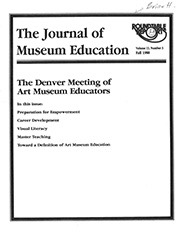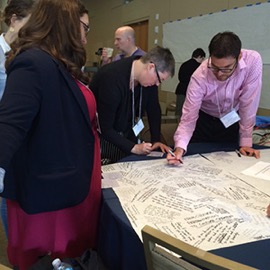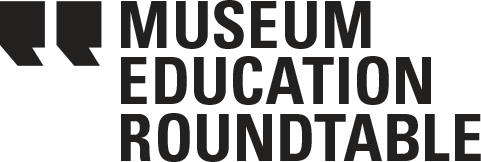Asking Beautiful, Scary Questions…
I recently enjoyed traveling to the great city of Denver, Colorado and participating in the Leading the Future of Museum Education: Challenges and Opportunities, a convening of an amazing group of museum leaders from across the country. This event, co-hosted by Bank Street College’s Leadership in Museum Education and the Education Professional Network (EdCom) of the American Alliance of Museums, offered a much-needed opportunity for educators in our field to come together and discuss issues, the future, and ask beautiful, scary questions.
In her opening remarks, Sarah Jesse, chair of EdCom and Vice President of Education at the Los Angeles County Museum of Art, introduced the idea of beautiful questions inspired by the book A More Beautiful Question by Warren Berger. A beautiful question is, “an ambitious yet actionable question that can begin to shift the way we perceive or think about something—and that might serve as a catalyst to bring about change.”
 Such questions seem to be ingrained in our DNA, for in 1987 a group of 25 art museum educators came together in Denver to explore similar issues and reforms, and to develop a collective vision for the future of the field. The Journal of Museum Education (JME) Volume 13, Number 3, Fall 1988 was dedicated to sharing the insights and key issues from the Denver Meeting. Guest edited and authored by the organizers and participants of that meeting, the JME issue reflected the individual thinking generated through their discussions and widened the conversation to engage more educators from across the field. I am proud to say that two representatives from my museum were in attendance in 1987.
Such questions seem to be ingrained in our DNA, for in 1987 a group of 25 art museum educators came together in Denver to explore similar issues and reforms, and to develop a collective vision for the future of the field. The Journal of Museum Education (JME) Volume 13, Number 3, Fall 1988 was dedicated to sharing the insights and key issues from the Denver Meeting. Guest edited and authored by the organizers and participants of that meeting, the JME issue reflected the individual thinking generated through their discussions and widened the conversation to engage more educators from across the field. I am proud to say that two representatives from my museum were in attendance in 1987.
Twenty-eight years later in Denver, our brainstorming and discussions focused on many of the same topics: the empowerment of museum educators as leaders; making our work visible; professional development and career tracks; visitor-centeredness; the lack of diversity and inclusion in our field; and leading change.
Much of the program and conversation in Denver focused on change on many different levels—the ever-changing and vast-paced world in which we live, the shifts and much-needed changes in our field and institutions, the rethinking of museum education, and the changes in us as individuals. Both Kaywin Feldman, the Duncan and Nivan MacMillan Director and President of the Minneapolis Institute of Arts, and Marsha L. Semmel, principal of Marsha Semmel Consulting, spoke of our VUCA environment and the need for adaptive and strategic leadership. VUCA is short for volatility, uncertainty, complexity, and ambiguity, and a catchall for our turbulent, dynamic reality. In order to thrive, we must have vision, understanding, clarity, and agility and be willing to experiment and take risks. Laura Roberts from Roberts Consulting points out there is no one way or single path to get us where we want to go and the “best practices” from the past won’t be sufficient.
We must challenge ourselves to find these new paths and ask beautiful, scary questions, which will inspire us to take risks and head into uncertain territory, and possibly fail. Some of the beautiful questions that emerged from our brainstorming and conversations in Denver:
- How might we encourage greater diversity and inclusion in our field?
- How might museums become truly visitor-centered institutions?
- How might we find balance in engaging both our core and new audiences; balance between co-creation and expertise?
- What if we broke down silos and collaboration was the new norm?
- How might we rethink our work with the public education sector?
- How might we harness the power of technology to expand access, improve engagement, and try new approaches to our work?
- What if excellence isn’t enough?
- What if educators became more empowered and began breaking the rules?
 To begin exploring the strategies and solutions to these beautiful questions, we must become adaptive leaders and both individually and collectively embrace the gradual but meaningful process of change. Marsha Semmel introduced us to John Seely Brown who believes in social, participatory learning and teaches us that museums need to stop protecting our assets—our stocks—of authoritative knowledge and instead nurture our flows—creating new knowledge. We are poised to cultivate these flows. Laura Roberts, who was asked to reflect on and summarize the convening stated in her closing remarks, “museum educators routinely use the sort of skills an adaptive leader needs. Moreover, if we are going to shift our museums from a focus on objects to a focus on visitors and community, it is clear we are positioned to lead the way…” She noted these observations about our character:
To begin exploring the strategies and solutions to these beautiful questions, we must become adaptive leaders and both individually and collectively embrace the gradual but meaningful process of change. Marsha Semmel introduced us to John Seely Brown who believes in social, participatory learning and teaches us that museums need to stop protecting our assets—our stocks—of authoritative knowledge and instead nurture our flows—creating new knowledge. We are poised to cultivate these flows. Laura Roberts, who was asked to reflect on and summarize the convening stated in her closing remarks, “museum educators routinely use the sort of skills an adaptive leader needs. Moreover, if we are going to shift our museums from a focus on objects to a focus on visitors and community, it is clear we are positioned to lead the way…” She noted these observations about our character:
- Educators are trained to elicit observations and points of view and to bring people together in dialogue. We are good facilitators. We have those “soft skills” to be boundary spanners.
- We are clever, creative, and imaginative. We are good problem solvers. We are good listeners.
- We practice the skills of collaboration and partnering. We are matchmakers and brokers.
- We often serve as the integrators in the institution, bringing disparate staff together.
- We are often “empowerers.” Many educators are refreshingly light on ego.
We have these skills, and we also need to become more empowered and better advocates for our values, our expertise, and our audiences. Insights on the Denver Meeting from Diane Brigham in the 1988 JME echo this concept, stating that our role is essential in serving the missions of our museums and that “when we realize that we offer abilities that no one else in the museum can contribute, we are better able to offer leadership. We empower ourselves when we are clear about what we are and have prepared ourselves to practice our profession with rigor.” It is essential for us to be more rigorous and confident in articulating our goals and vision, and ask beautiful, scary questions that will serve as catalysts for innovation and change in our field and our communities.
What are your beautiful, scary questions?
Karleen Gardner is Director of Learning Innovation at the Minneapolis Institute of Arts. She leads initiatives and experiments in interpretation and learning, and works to make the museum accessible and relevant for all audiences. Karleen currently serves on the board of directors of the Museum Education Roundtable, on the editorial team, and as a peer reviewer for the Journal of Museum Education.

